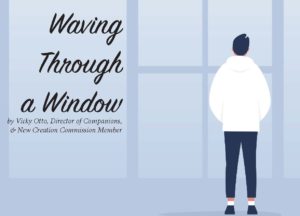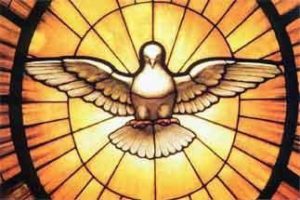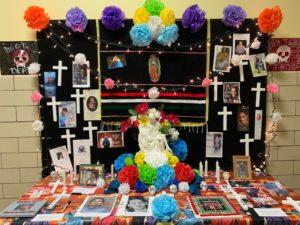Jan 5, 2019
by Vicky Otto, Precious Blood Companions Director
 I have written often about my love of musicals. In November, I had the opportunity to see a production of the currently popular, Dear Evan Hansen. At the beginning of the show, Evan sings a song called “Waving Through a Window.” There is a verse in the song that beautifully echoes our need to renew and rededicate ourselves to listen for the cry of the blood during our New Creation process. He sings, “While I watch, watch, watching people pass, waving through a window, can anybody see, is anybody waving back at me?”
I have written often about my love of musicals. In November, I had the opportunity to see a production of the currently popular, Dear Evan Hansen. At the beginning of the show, Evan sings a song called “Waving Through a Window.” There is a verse in the song that beautifully echoes our need to renew and rededicate ourselves to listen for the cry of the blood during our New Creation process. He sings, “While I watch, watch, watching people pass, waving through a window, can anybody see, is anybody waving back at me?”
Who is waving through our windows today? I had an experience recently that reminded me of the importance of this message. As the community knows, one of our Companions, Tim Wanner, is currently serving a prison sentence in Illinois. As the Director of Companions, I try to visit all our Companions and I finally had the opportunity to visit Tim this past fall. One thing you should know is I have never been to a prison or had any experience in jail ministry. While preparing for the visit my nerves tried to get the better of me as I wrestled the reality of meeting someone for the first time, what would prison be like, how do I talk for four hours to someone I have never met—and the list went on and on. Looking back now, I realize that I could have stopped at that point and just said, “Nope, not going.” But the Spirit led me on and I went on the visit.
When you check in at the prison, you have to leave your personal belongings in a locker. I think the Spirit helped me to leave my anxieties there as well. We had a wonderful visit. I found Tim to be an interesting man who has read a lot about different subjects and is willing to engage in a lively discussion—even if our opinions didn’t match. He was kind and respectful as we both reached out in faith to form a new relationship. As I looked around the visiting room there were people of all ages and ethnicities who were also engaged in conversations with others who were in prison. There was no holding back or lack of engagement from anyone in the room. When our visit concluded and the visitors were escorted out of the room, there was a sense of sadness from everyone that this bond had to be broken once again.
For me, Tim was waving through a window, through the boundaries and barriers that we put around ourselves so people who don’t fit in our world won’t bother us. As a Precious Blood community, our spirituality calls us to stand with all those people who don’t fit in our world. As our community becomes a new creation, we are called again to remember that we have a duty and responsibility to respond to the cry of the blood. I would imagine that each of us has had those same moments of fear that I did. St. Gaspar wrote, “May our fear be filled with trust in the one who shed for us his most Precious Blood to the last drop.” The fears that we face today are different, but still as relevant as those St. Gaspar faced as he began the community. What doesn’t change, however, is that we don’t stand alone; Christ is always walking with us. St. Gaspar wrote, “You can imagine Jesus walking in front of you in every situation, bearing his cross; or, with a chalice in hand, he has you swallow from it drop by drop.”
Our world needs the healing that the Precious Blood offers us now more than ever. We live in a time when divisions and blatant hostility have become such a norm that most people just shrug their shoulders in response. The cry of the blood calls us to respond differently. As we continue our work as a community to become a new creation, we again must ask ourselves the question, “Where does the cry of the blood call us?” What gives me great hope is that as we explore this question as a new creation we will respond with new vision, with new imagination, with fewer obstacles, and with renewed commitment to our Precious Blood spirituality.
I look forward to the work of the community as we continue to dream and envision this new creation. Where will the cry of the blood call us? My hope is that each of us through prayer and discernment listens anew. We need to see with new eyes those who stands outside the circle in our world today. Who is waving through a window? As we begin this new year, my prayer is that we will look closely through the eyes of faith and wave back. Ω
Jan 4, 2019
by Gabino Zavala, Justice and Peace Director
 For the 52nd World Day of Peace, celebrated on January 1st, Pope Francis said, “Good politics is at the service of peace.” He states that those who hold political office exercise that office in service of others. Politicians must base their work on charity and virtue. Pope Francis warns of the dangers that can afflict politics, such as corruption, xenophobia, racism, lack of concern for the environment, and contempt for exiles. He concluded by calling peace “the fruit of a great political project grounded in the mutual responsibility and interdependence of human beings,” and, “it is a challenge that demands to be taken up anew.” Read the Pope’s full message here.
For the 52nd World Day of Peace, celebrated on January 1st, Pope Francis said, “Good politics is at the service of peace.” He states that those who hold political office exercise that office in service of others. Politicians must base their work on charity and virtue. Pope Francis warns of the dangers that can afflict politics, such as corruption, xenophobia, racism, lack of concern for the environment, and contempt for exiles. He concluded by calling peace “the fruit of a great political project grounded in the mutual responsibility and interdependence of human beings,” and, “it is a challenge that demands to be taken up anew.” Read the Pope’s full message here.
Let me share with you the “Beatitudes of the Politician” which Pope Francis quoted from Vietnamese Cardinal Francois-Xavier Nguyen Van Thuan, who died in 2002:
“Blessed be the politician with a lofty sense and deep understanding of his role.
Blessed be the politician whom personally exemplifies credibility.
Blessed be the politician who works for the common good and not his or her own interest.
Blessed be the politician who remains consistent.
Blessed be the politician who works for unity.
Blessed be the politician who works to accomplish radical change.
Blessed be the politician who is capable of listening.
Blessed be the politician who is without fear.”
As Missionaries of the Precious Blood we understand that peace is central to the mission of the disciples of Christ. Let us pray for peace in our hearts, our families, our communities, our nation and in our world.
Jan 3, 2019
 by Lina Guerrero, Precious Blood Volunteer
by Lina Guerrero, Precious Blood Volunteer
It was around 7 o’clock in the morning on October 10th, 2011 in Austin, Texas. I was seventeen years old and sitting outside on the porch of my house with our pastor Fr. Bill Wack, C.S.C. (now known as Bishop Bill, but I still can’t help but call him Fr. Bill). It was a Monday morning, the usual day when the trash collectors come. I remember sitting there in silence with Fr. Bill watching the world go by and workers going about their day trying to make their living. The collectors reach my house and just passed by, because we hadn’t put the trash bins out. They go along, but we stayed there, sitting still. I turn to Fr. Bill and say to him, “It’s weird how they just go about their day, and they have no idea what’s going on in this house or why our trash bins aren’t on the curb.” He just looks up, smiles, and says to me, “Yeah, it’s almost like an ignorant bliss.”
About an hour before this scene my aunt—affectionately known as Tia Mari—had died after a long five-month stint in hospice care in my home. She had been battling breast cancer for a long time, and that moment on the porch after her painfully long death was filled with a crippling sense of anger, sadness, relief, and confusion. How can people like those trash collectors go about their day when we’re sitting here with our world rocked by the death of our loved one? How can the world go on when we’re sitting here still, feeling like we can’t move, or even breathe? I remember feeling angry about this realization, specifically because the world and the people in it move everyday in the “ignorant bliss” of so much death and suffering.
Fast forward to December 5th, 2018. I’m sitting in the large gathering room at Precious Blood Ministry of Reconciliation (PBMR) in Chicago, Illinois. There is a heaviness and stillness in the place, much like that morning on the porch, and I’m feeling that same sense of anger all over again except this time it is for a very different reason. That morning we woke up to the news that one of our young men in our programs was killed during the night. He was 21 years old, and appeared rather frequently at the center. I interacted with him occasionally, but not enough to know him on a personal level. However, many people at the center knew him very well for many years. This young man is the latest PBMR family member to die, and unfortunately death is known very well here. The reality of death is with us everyday, almost as if we are constantly waiting for it to happen, but hoping and praying that it doesn’t.
For as long as I can remember, I have always had a weird relationship with death. During my year as a Jesuit Volunteer in Kansas City, I remember crying in the middle of a bar with my spiritual director while talking about the spirituality of death. Everytime I hear that someone has died, I sort of get a sense of numbness. And if I’m being honest, I don’t know if this numbness comes from me having multiple experiences of people close to me dying, or if the concept of death just scares the hell out of me.

2018 Day of the Dead altar at PBMR
So why do I currently volunteer/work at a place where death is a common occurrence? Hell, I ask myself that question everyday. But if there’s anything I can say, I think it comes from the fact that it’s one thing to die from an illness, a car accident, or natural causes- things that we have no control over-but a completely different thing for someone to die from violence, a cause that can, should, and could have been prevented by various measures. The deaths we encounter most at PBMR are deaths of the latter kind- deaths that because our society is structured and conditioned to value some lives more than others, rock communities and individuals to their very core.
But like that morning on the porch and that morning at the Center, the anger at the ignorance of death–whether it is intentional or not–makes me feel some kind of way. I think of the way people are killed in the streets everyday, and people go about their lives as if it doesn’t matter. Jesuit Father Greg Boyle of Homeboy Industries has said that, “The wrong idea has taken root in the world. And the idea is this: there just might be lives out there that matter less than other lives.” How many people in our society would ask whether the young man who died was a gang member? A Black man? Someone who lived on the south side of Chicago? Why was he walking late at night? Did he deserve to die even if all of those things were true? These are the questions that I’ve been asking myself since that morning. And I can definitely tell you that according to the many people who knew this young man here at PBMR, he didn’t deserve to die. His life mattered, even if the ignorance of others says otherwise.
I’m going to be straight up and say that I don’t have any answers to what I speak of here. But what I do know is that I’m tired of living in a world where we have to convince people to care about others, to pay attention to their own privilege, to not be in their own “ignorant bliss” about the lives of others due to the perception that some lives matter more than others. I get angry a lot about these things now-a-days, and I think that’s okay. Jesus got angry and flipped tables too. But also like Jesus with Lazarus, He made space to honor the anger of Martha, to weep and mourn the death of His friend. And even though we know that death doesn’t have the final word, the anger, the weeping, and lamentation are holy too. And that’s where I want to be.
Lina is a current Precious Blood Volunteer serving at Precious Blood Ministry of Reconciliation in Chicago.
To learn more about becoming a Precious Blood Volunteer go to www.preciousbloodvolunteers.org.
This article originally appeared in the January 2019 edition of the New Wine Press.
 I have written often about my love of musicals. In November, I had the opportunity to see a production of the currently popular, Dear Evan Hansen. At the beginning of the show, Evan sings a song called “Waving Through a Window.” There is a verse in the song that beautifully echoes our need to renew and rededicate ourselves to listen for the cry of the blood during our New Creation process. He sings, “While I watch, watch, watching people pass, waving through a window, can anybody see, is anybody waving back at me?”
I have written often about my love of musicals. In November, I had the opportunity to see a production of the currently popular, Dear Evan Hansen. At the beginning of the show, Evan sings a song called “Waving Through a Window.” There is a verse in the song that beautifully echoes our need to renew and rededicate ourselves to listen for the cry of the blood during our New Creation process. He sings, “While I watch, watch, watching people pass, waving through a window, can anybody see, is anybody waving back at me?”

 by
by 